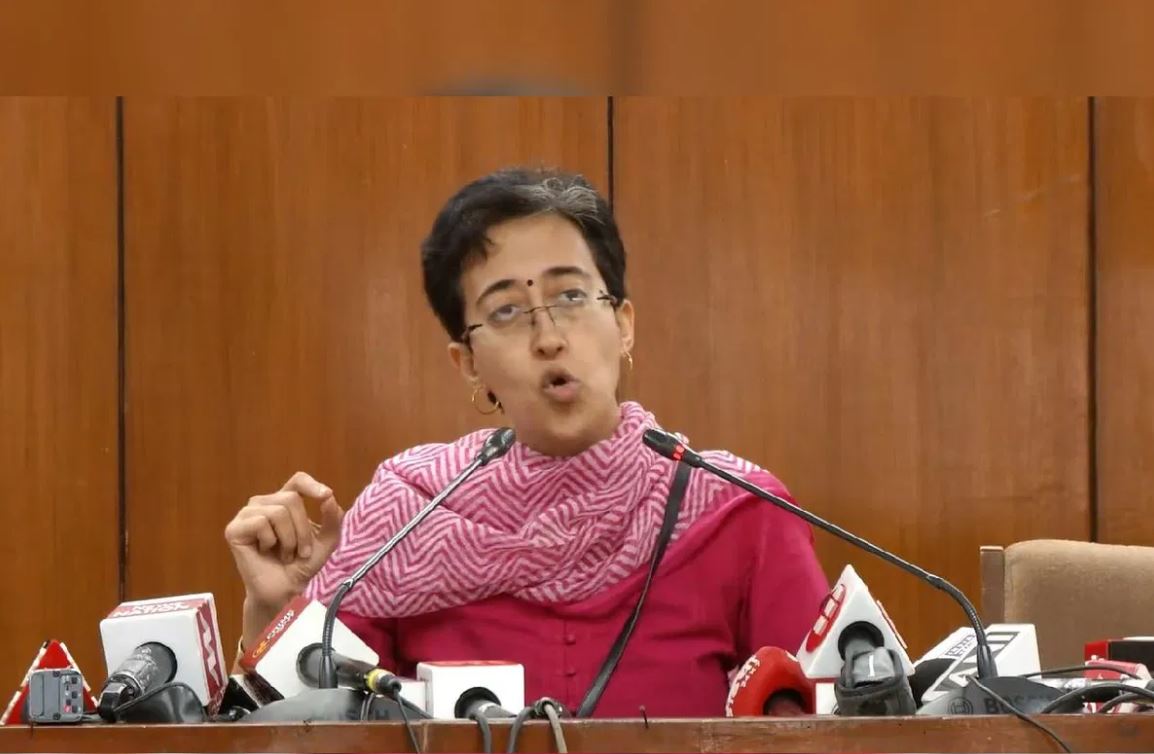


As temperatures rise in Delhi, so does the water crisis in the city. In response, Aam Aadmi Party leaders are set to meet with Lieutenant Governor VK Saxena to discuss solutions. Meanwhile, Delhi Water Minister Atishi refuses to end her hunger strike until the Haryana government provides enough water for the city's 28 lakh residents. She claims that Haryana has been holding back 100 MGD of promised water, exacerbating the situation.
Delhi's Water Woes: A Crisis Brewed by Political Impasse
Delhi, the sprawling capital of India, is facing a severe water crisis, leaving its residents desperate for relief. The crisis has escalated in recent days, with Aam Aadmi Party (AAP) leaders demanding a solution and Delhi Water Minister Atishi Marlena launching a hunger strike.
Background
Delhi's water woes are not new. The city has long struggled with inadequate infrastructure and a growing population. The city receives water from neighboring states, including Haryana and Uttar Pradesh. However, supply has often been unreliable, especially during the hot summer months.
The current crisis was triggered by the Haryana government's decision to cut back on water supply to Delhi. Haryana claims that it needs to reserve water for its own residents and farmers. Delhi, on the other hand, accuses Haryana of playing politics and withholding water.
Political Impasse
The water crisis has become a political battleground between the AAP, which governs Delhi, and the Bharatiya Janata Party (BJP), which rules Haryana. AAP leaders have accused the BJP of using water as a weapon against Delhi. BJP leaders have denied these allegations and blamed AAP for mismanaging water resources.
Atishi's Hunger Strike
In a bid to pressure the Haryana government, Delhi Water Minister Atishi Marlena launched a hunger strike on July 18, 2023. She has vowed to continue her hunger strike until Haryana provides the promised 100 MGD of water.
Impact on Residents
The water crisis is having a devastating impact on Delhi's 28 lakh residents. Many areas are experiencing severe water shortages, with residents having to wait hours or even days for water. The situation is particularly dire in slum areas, where access to clean water is already limited.
Top 5 FAQs
1. Why is Delhi facing a water crisis? A: The crisis is caused by a combination of factors, including inadequate infrastructure, a growing population, and unreliable water supply from neighboring states.
2. What is the Haryana government's role in the crisis? A: Haryana has cut back on water supply to Delhi, claiming that it needs the water for its own residents and farmers.
3. What is Atishi Marlena doing to address the crisis? A: Atishi Marlena has launched a hunger strike to pressure the Haryana government to provide the promised 100 MGD of water.
4. What is the political dimension of the crisis? A: The crisis has become a political battleground between the AAP, which governs Delhi, and the BJP, which rules Haryana. AAP accuses the BJP of using water as a weapon against Delhi, while the BJP denies these allegations.
5. What is the impact of the water crisis on Delhi's residents? A: The crisis is having a devastating impact on Delhi's residents, with many areas experiencing severe water shortages and long wait times for water.

In a significant development, Defence Minister Rajnath Singh inaugurated Hindustan Aeronautics Limited's third production line for the LCA Tejas Mk1A and also witnessed the aircraft's successful maiden flight in Nashik. The event also marked the inauguration of HAL's second production line for the Hindustan Turbo Trainer-40 (HTT-40). With the approval of the purchase of 97 LCA Mark 1A fighter jets, the need for new inductions has been underlined by IAF chief AP Singh, while HAL officials remain confident in meeting this requirement.

In a significant development, over 200 Maoist rebels, including top leaders Rupesh and Ranita, have surrendered to Indian security forces in the Bastar region of Chhattisgarh. This marks a critical moment in the long-standing fight against Naxalism in the country. The region of Abujhmarh and North Bastar, known for its dense forests and difficult terrain, has historically served as a safe haven for Maoist groups, making it challenging for authorities to root out their presence. The massive surrender of Maoists is not only a tactical win but also a symbolic victory in the government's efforts to rid the "Red Corridor" of Naxalite influence.

Amidst his busy schedule, Congress leader Rahul Gandhi is set to make a heartfelt tribute to Zubeen Garg, the beloved singer of Assam, by attending his last rites at 'Zubeen Kshetra' in Sonapur. In anticipation of his arrival, strict security measures have been implemented in the area since morning, with a thorough inspection conducted by Gaurav Gogoi. With the deployment of police, paramilitary forces, and CCTV cameras, all eyes will be on the site to ensure a peaceful and incident-free event.

The Supreme Court has agreed to hear Tamil Nadu Deputy Chief Minister Udhayanidhi Stalin's plea in 2026 to combine and transfer all FIRs and complaints related to his comments on "eradicate Sanatan Dharma" made in 2023. Stalin's lawyer, Mukul Rohatgi, argued that multiple FIRs and complaints had been filed against his client and requested for the matter to be posted in 2026. The top court had previously ordered no new FIRs to be registered against Stalin without its permission, stating that multiple complaints on a single issue were not valid.

President Droupadi Murmu has announced the launch of the Adi Karmayogi Abhiyan, aimed at promoting self-reliance and self-sufficiency in every tribal village. The initiative, organized by the Ministry of Tribal Affairs, is a step towards ensuring that tribal communities are included in the development journey of the nation. The National Conclave on the Adi Karmayogi Abhiyan, held in New Delhi, saw the participation of top government officials and tribal representatives from across the country. The focus of the conclave was on "Tribal Village Vision 2030" and how to implement it for the benefit of tribal communities.

Former Trump administration national security adviser John Bolton has been charged with illegally retaining and sharing classified documents from his time in government. The indictment alleges that Bolton shared more than 1,000 pages of information with relatives through a personal email account, which was hacked by an entity believed to be affiliated with Iran. The case raises questions about the use of the Department of Justice to target political opponents.

US President Donald Trump announced his plans to meet with Russian President Vladimir Putin in Hungary to discuss and potentially end the ongoing war between Russia and Ukraine. Before their meeting, US officials will convene with representatives from Russia to attempt to reach a resolution. This comes after a phone conversation between the two leaders, in which Putin also congratulated Trump on achieving peace in the Middle East. Trump believes this success could have a positive impact on negotiations to end the Russia-Ukraine war.

Jammu and Kashmir Chief Minister Omar Abdullah has made the announcement to revive the historic Darbar Move tradition, which involves shifting government offices biannually between Srinagar and Jammu. The tradition dates back to the 19th-century and was initiated by Maharaja Ranbir Singh to ensure administrative accessibility across the region. The decision to revive Darbar Move reflects an effort to reconnect with the region's rich history while addressing current administrative needs.

Union Home Minister Amit Shah clarifies that the decision on who will be the next Chief Minister of Bihar will be made by the BJP-led alliance, after the state's elections. Shah stresses the importance of alliance dynamics and the respect for Nitish Kumar's leadership. Despite BJP's larger representation in the alliance, Kumar's experience and history of opposing Congress makes him a crucial leader in Indian politics.

American President Donald Trump is set to visit Walter Reed National Military Medical Center for a semi-annual physical checkup. Speaking to reporters, Trump stated that he feels physically and mentally fit, adding that he prefers getting checkups done early. This marks his second visit to the medical center since returning to the White House in January, though the details of this examination are yet to be revealed.